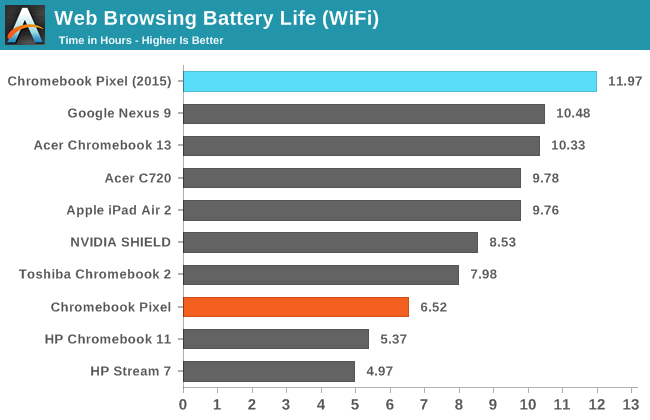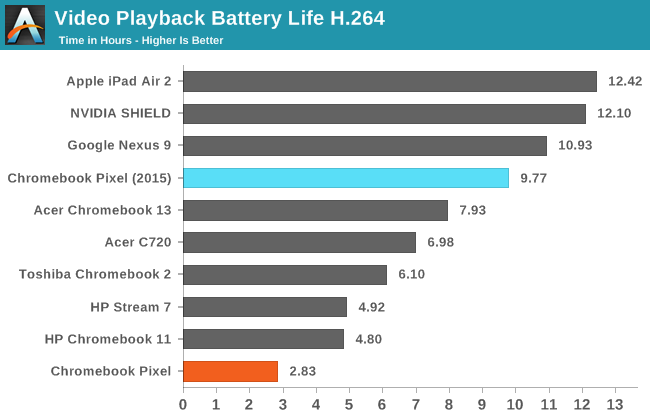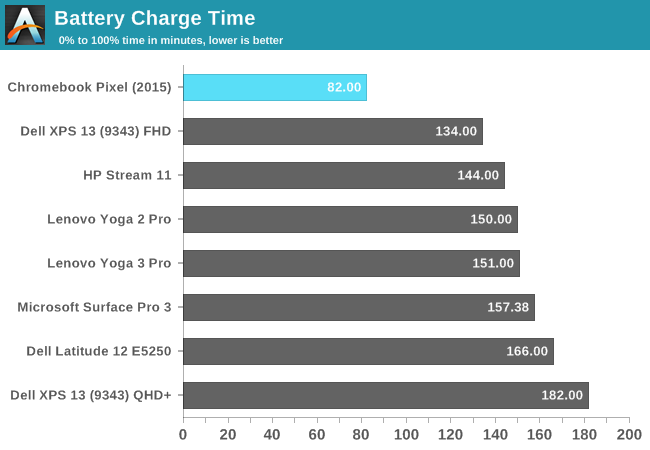The Chromebook Pixel (2015) Review
by Brandon Chester on March 16, 2015 8:00 AM EST- Posted in
- Laptops
- Chrome OS
- Chromebook
- Chromebook Pixel
Battery Life
One area where Google claims to have made large improvements over the original Pixel is battery life. The 2013 version of the Pixel would typically manage six or seven hours of battery life, which was decent but not outstanding at the time. Given that the Pixel did not run much more than a web browser, it was actually somewhat disappointing to see it falling behind other laptops like the 13" MacBook Pro with Retina display which was substantially more powerful and capable. Google claims that the new Chromebook Pixel will achieve up to twelve hours of battery life, which is quite a lofty goal considering it is around twice the battery life of the original. Given that the new Pixel has the same 59 Wh battery as its predecessor, all of the battery life improvements have to come from reduced component power usage and software optimizations.
The two main areas where power usage has been reduced are the CPU and the display. The CPU is one of Intel's new Broadwell-U processors, built on their 14nm manufacturing process. While it is faster than the Ivy Bridge Core i5 used in the original Pixel, it has significantly reduced power usage due to architectural improvements and the move from a 22nm to a 14nm fabrication process. The display is similar to the original, but Google is now using Content Adaptive Backlight Control (CABC) to manage backlight brightness based on the display's Average Picture Level (APL), as well as Panel Self Refresh (PSR). It should be noted that although PSR is a display feature, it's actually a method of reducing CPU/GPU and display bus power usage, not LCD panel power usage.
To see if Google achieved their goal of a twelve hour battery life, I have run the Pixel through our standard web browsing test as well as our H.264 video playback test.


In our WiFi web browsing test, the Pixel is only two minutes short of Google's up to twelve hours rating, and with that battery life it sits well above all the other tablets and Chromebooks. In our video playback test it still performs very well with 9.77 hours, but it doesn't end up lasting quite as long as some of the most recent tablets. Regardless, the battery life in both scenarios is an absolutely massive improvement over the original Pixel, with almost two times the battery life during web browsing and over three times the battery life when playing back videos.
Charge Time
As mentioned earlier, the new Chromebook Pixel uses USB Type-C for charging. Since the Pixel has a Type-C port on each side, you can charge it from both the left and the right. While this doesn't sound like a big deal, it can be the difference between charging and not charging in situations where you're far from an outlet. It is also just a great connector in general, and the fact that it is just USB means that you can use a USB Type-A to Type-C cable to charge off of any existing USB port, with the caveat that it's going to charge slower. Google includes a 60W USB Type-C charger with the Pixel, and offers a Type-A to Type-C cable for $12.99.

The Pixel does exceptionally well in our charge time test, reaching a full charge nearly an hour quicker than the XPS 13 which was previously the quickest to charge. The quick charging combined with the extremely long battery life should ensure that Pixel users are never stuck tethered to a power outlet.










123 Comments
View All Comments
Brandon Chester - Monday, March 16, 2015 - link
The issues with benchmarking it against other laptops are explained on the CPU performance page.MantasPakenas - Monday, March 16, 2015 - link
What I meant is that I don't see how those are issues. The issue that there are very few benchmarks you can run on a Chromebook? Yeah, sure. But where is the issue of including data points you already have for other laptops for these same benchmarks? E.g. here:http://www.anandtech.com/bench/Notebook/729
You also have charging times of normal laptops, as well as browsing and video playback battery life. Why not include those? I really don't see how comparing this to an iPad makes any more sense.
JarredWalton - Monday, March 16, 2015 - link
The "Light" and "Heavy" laptop tests are completely different than what we run on Chomebooks. The Light test uses IE10/11, cycling through a set of four open tabs. We could probably do this on a Chromebook, though we would need to modify it to make it work comparably (as the Windows Light test actually runs from a batch file).The Heavy test is a different matter. We're playing a 1080p video fullscreen, surfing the web with four pages loading every ~7 seconds, and downloading over FTP at 8Mbps. Without a good FTP client, this is pretty much impossible to do on a Chromebook. Plus on every other Chromebook other than the Pixel (and maybe the Core i3 Acer models) you won't be able to do all of these tasks without the video stuttering.
Bottom line is that most Chromebooks have hardware and pricing that's similar to tablets, so we use the tablet benchmarks for comparison.
MantasPakenas - Tuesday, March 17, 2015 - link
If I understand correctly, you're saying that it would be possible to benchmark the Pixel against it's real competition, but since most of the Chromebooks are underpowered, you are putting this monster up against much weaker devices. This still doesn't make sense to me. HP Stream 11 costs, performs and competes against Chromebooks, yet you measure it mostly against high end laptops (although C720 is included in some applicable benchmarks, and even an iPad Air in charging times). I question that approach as much as this case.Just as much as it makes sense to benchmark SSDs against other SSDs, low end phones against other low end phones, high end ones against iPhone 6 and tablets, it makes sense to benchmark the Pixel against high end laptops, because it deserves that treatment. Nobody is any wiser to know it can beat all tablets and budget chromebooks.
And I bet it wouldn't stutter playing a video, downloading and surfing the web at the same time. Yet I'm doing all those things concurrently on my HP Chromebook 14, and you bet I would do it on the Pixel!
jabber - Wednesday, March 18, 2015 - link
Indeed, I've seen plenty people pay $1200+ for a Macbook/Mac just to look at Facebook/Amazon because they didn't want to deal with Windows anymore.mekpro - Monday, March 16, 2015 - link
Nice review and really fast !I wish there are more extensive tests for USB Type-C, as this is the very first laptop to ship with it. I wonder what is the maximum resolution and how many external display supported ? Is the limitation come from the USB Type-C or Broadwell or the ChromeOS itself ?
Dumbledore147 - Monday, March 16, 2015 - link
Me too. I would love to see a setup with two 4k monitors running at 60 Hz while charging the chromebook.psychobriggsy - Monday, March 16, 2015 - link
The device, like the new MacBook, supports USB 3.1 Rev 1, otherwise known as USB 3.0 (i.e., 5 Gbps) on a USB Type C port (which adds charging, displayport, USB 2.0).We'll have to wait until Broadwell supports USB 3.1 Rev 2 for 10 Gbps data transfers.
tyger11 - Monday, March 16, 2015 - link
Type-C is a connector. The underlying port itself is a standard 5gbps USB 3.0 port. It's unfortunate they didn't go with USB 3.1, but neither did the new Apple MacBook Retina (even though they're calling it 'USB 3.1 Gen 1'. Ugh.JBVertexx - Monday, March 16, 2015 - link
This is a very targeted strike directly at the MacBook pro. The current market is very small, as many have commented on. I think an equally likely user is an account executive for companies that use the Google ecosystem.My company (a pre-IPO enterprise software company) uses the entire Google ecosystem. So, when I am traveling, I use either Gmail, Google docs, or some other web-based application for nearly 100% of my use. The percentage of time that I need to actually use MS Office is getting smaller and smaller.
When you compare this against the new 13-inch MacBook pro, the specs compare very favorably. The Pixel has a stronger processor (the 13" MacBook pro only ships with an i5), but the Pixel has much less storage space, clearly catering to cloud users (100% of what I store is in the cloud).
Google may be giving these away to developers, but I don't think that is the target audience for this. There is a small sliver of working professionals who will buy this over a MacBook pro. Google is using that niche market to improve the product, improve Chrome OS, and will over the next couple years be well positioned to be a serious competitor.